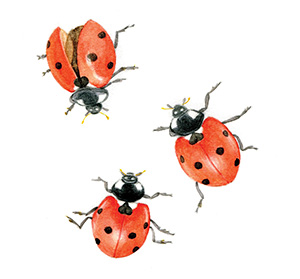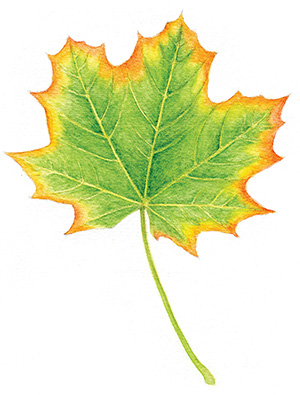Rest is not idleness, and to lie on the grass under the trees on a summer's day, listening to
the murmur of the water, or watching the clouds float across the sky, is by no means a waste of time.
-John Lubbock, 1834-1913
Dear Friends:
This is the time the poets call "high summer." The grass is high, the weeds are high, the price of gas is high; maybe that's why they call it high summer. Especially in Maine, we have a lot of frolicking to pack into a short season. This is it. It's now or never. That's why our streets are filled with out-of-staters; the bays are filled with boats; the beaches are brimming with bathers; and hikers are tramping over the mountain like ants over-running a picnic table. It's high summer, so let's get down and enjoy it.
Field and Forest Report, August
On these misty mornings before the dew has dried, the flat webs of grass spiders (Agelenopsis) are strewn far and wide, tiny silken veils scattered over the fields like favors left from a wedding of the wee folk. These webs have a few strands overhead to snag flying or jumping insects and then drop them onto the net where the spider lurks in a small tunnel. Sensing movement, she dashes out and paralyzes her unfortunate prey with a venomous bite. These webs coincide with abundant small grasshopper nymphs, just the right size to get caught in Agelena's clever trap. To get a look at this elusive spider, try tickling its web with a blade of grass.
Queen Anne's Lace, Daucus carota or wild carrot, is in bloom just about everywhere right now. The flowers look like little white lace doilies and have a rich sweet-to-spicy aroma. Some flowers have a dark-red blossom in the center to attract insects, and the strong scent draws pollinators from far and wide. Your commentator observes few bees, but numerous types of syrphid flies jittering about on the tiny flowerlets. Syrphid flies often mimic bees with yellow stripes around the abdomen, but when at rest, their wings point outward like a fly's instead of lying close together like a bee's. Syrphids do not sting or bite, but eat nectar and pollen and are important pollinators.
The autumn asters begin to bloom in the fields, and a few of the hardwood trees show the tiniest bit of color. Along with these late summer flowers come the late summer insects. The elusive shiny black field crickets (Gryllidae) have gone through several molts since spring and are now adult. Male crickets enthusiastically sound their love songs in the tall grass, while the females pretend to ignore them but are actually listening closely. You know how it goes.
The main event out there is the blueberry harvest. Our state's trademark fruit is being harvested on 60,000 acres of barrens by tens of thousands of migrant workers from south of the border and the islands of the Caribbean. The marvelous fruit raked by these hard-working visitors to our shores adds $70 million to $80 million to the Maine economy annually. Greet them with a hearty hello when you see them at the local store. They've earned it.
Mountain report

Illustration by Candice Hutchinson
Local wisdom says that if the top of the mountain is invisible, it's going to rain. Ignoring this tradition, your commentator started up Awanadjo-Blue Hill, or "small misty mountain" in the Algonkian language, recently with the summit completely covered in cloud, a thick gray veil hanging low over the bay all the way to Cadillac Mountain, and a light rain falling. On the climb up, the oaks and birches provided some shelter, but at the top the fog was thick enough to hold in your hand and the rain ran off in sheets. The woods were silent except for the rattle of raindrops. The stones glistened as if varnished. The heavens soaked my head and the firmament my feet. This is what happens when your cathedral is roofed by sky.
Field and forest report, September
Red maples are beginning to flame carmine in the marshes. Under the oak trees the ground is littered with leafy twigs clipped off by squirrels to be stripped of their clumps of acorns on the ground. The squirrels have discovered that this technique is much easier than taking the nuts from the tree and carrying them down one or two at a time. Blue jays, too, have returned from the woods to gather and hide acorns for the coming winter, and chipmunks stuff their cheeks, all of them feeding each other while planting the oaks of tomorrow.
Rank opinion
Watching the savage squirrels, primitive chipmunks, and barbarian blue jays gather nuts and seeds one notices that they do not seem to fight over them. They do not claim others' territories for their own; they do not lock up their supplies and defend them with bared teeth or claws; they do not refuse to share with other creatures. They mostly ignore each other and take turns under the trees and the bird feeders. If there is a short crop of acorns, they all suffer alike. If there is a heavy crop, they all benefit.
Natural events, October
Orion is riding high and the Full Hunter's Moon of October will soon be history. The woolly bear caterpillars stroll across the road, the ladybugs flock to the warm side of the house, the tomato plants are still green and the basil stands fresh in the garden, but this cannot last. Scattered reports of frost in town and some bright Canadian highs blowing through bring down the red and yellow maple leaves and the bronzy ash leaves, and draw the smell of wood smoke into the air. Bird migrations have begun with hummingbirds gone from the feeder, hawks brushing the hilltops, Canada geese honking a chilly farewell, and great blue herons heading south like flying compass arrows.

Illustration by Candice Hutchinson
The annual human migration is in full swing, too, as summer places are closed up and the keys turned over to caretakers. Winter well. We'll see you again come spring.
Seedpods to carry around with you
From naturalist Hal Borland: "Summer ends and autumn comes, and he who would have it otherwise would have high tide always and a full moon every night."
And from Emily Bronte: "Every leaf speaks bliss to me, fluttering from the autumn tree."
That's the almanack for this time. But don't take it from us-we're no experts. Go out and see for yourself.
Yr. Mst. Hmble & Obd'nt servant,
Rob McCall
Rob McCall will step down from his position as minister of the First Congregational Church, Blue Hill, Maine, in September. This almanack will continue, and is excerpted from his weekly radio show, which can be heard on WERU FM (89.9 in Blue Hill, 99.9 in Bangor) and streamed live via www.weru.org. His latest book, Great Speckled Bird: Confessions of a Village Preacher, is available through your local bookstore.

Illustration by Candice Hutchinson

Illustration by Candice Hutchinson
Magazine Issue #
Display Title
Awanadjo Almanack
Secondary Title Text
Welcome to Blue Hill: the Town, the Bay, the Mountain
Sections






